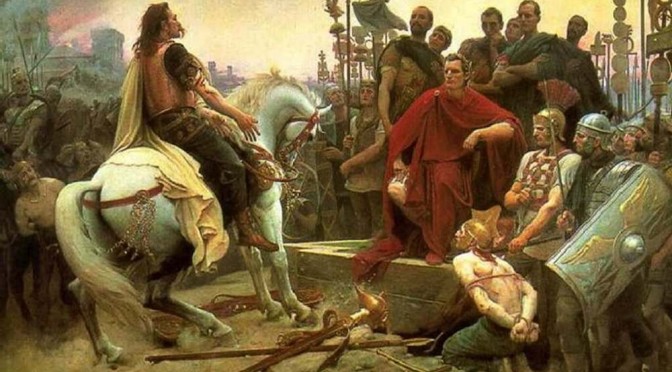Julius Caesar
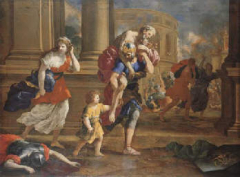 In BC 61 Julius Caesar, at that time part of a triumvirate with Pompey and Crassus, became governor of South Eastern Hispania and had the opportunity to observe the Celtic cultural preferencers first hand. Caesar’s tribe, the Julii (gens, family) claimed direct decendance from Anenaus, the founder of Rome and therefore the goddess Aphrodyte . He realised that although he was Governor, Pompey was in celtic eyes High King. There was little he could do in Hispania but he became focussed on the other Celtic territories, Gaul and Britain. If he could become high king there then he could return to Hispania later.
In BC 61 Julius Caesar, at that time part of a triumvirate with Pompey and Crassus, became governor of South Eastern Hispania and had the opportunity to observe the Celtic cultural preferencers first hand. Caesar’s tribe, the Julii (gens, family) claimed direct decendance from Anenaus, the founder of Rome and therefore the goddess Aphrodyte . He realised that although he was Governor, Pompey was in celtic eyes High King. There was little he could do in Hispania but he became focussed on the other Celtic territories, Gaul and Britain. If he could become high king there then he could return to Hispania later.
The human side of Aeneas parentage was a Trojan who had fled to the west after the fall of Troy. According to the Celts the founder of their race was also a Trojan, Brutus who had also spent time on the Italian peninsula but had then visited the northern slopes of the Pyrenees (occitan)before settling in the British isles. These stories were documented much later by Virgil (the Aeneid) and later again by Geoffrey of Monmouth(Historia Regnum Britanniae). Both books much must have been part of the oral tradition. Many historians discredit completely the story of Aeneus and Brutus but what is important is what the Celts and Romans at the time believed in it.
Provincia Nostra
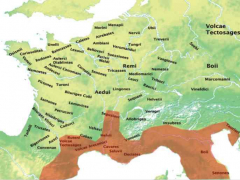 In BC 61 Julius Caesar, at that time part of the first triumvirate with Pompey and Crassus, became governor of South Eastern Hispania and had the opportunity to observe the Celtic cultural preferences first hand. He realised that although he was Govenor, Pompey was in Celtic eyes still High King. There was little he could do at that time in Hispania but he became focussed on the another Celtic territory, Gaul
In BC 61 Julius Caesar, at that time part of the first triumvirate with Pompey and Crassus, became governor of South Eastern Hispania and had the opportunity to observe the Celtic cultural preferences first hand. He realised that although he was Govenor, Pompey was in Celtic eyes still High King. There was little he could do at that time in Hispania but he became focussed on the another Celtic territory, Gaul
Partly to facilitate the continual struggle in Hispania, Rome had established a province on the southern coast of France.
It was initially known to the Romans as Provincia Nostra, Our Province, or simply Provincia, The Province. Provincia was based on the Greek cities of Messalia and Empurion. The takeover followed the, by now familiar, fashion of converting an alliance , by inserting a colony and then converting the whole area into a province. It was regarded as and governed as, another part of Italy. There was no room for self rule in Provencia Nostra, “Our Province”
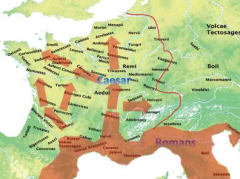 As Caesar moved north, he initially opted for an extension of Provincia Nostra, but encountered dozens of Gallic clans all of who saw themselves as independent.
As Caesar moved north, he initially opted for an extension of Provincia Nostra, but encountered dozens of Gallic clans all of who saw themselves as independent.
Caesar used the legends about his ancestry to legitimise himself as the Gallic High King. One of the reasons for Caesars rapid conquest of Gaul was his understanding of the gallic psyche. It resolved itself into a conflict with other potential high kings, particularly Vercingetorix, which concentrated the action.
Another reason was that Eastern Gaul was suffering from Germanic invasions across the Rhine. Caesar promised to put a stop to these disturbances, which is exactly the kind of “protection” a high king would offer. In 55 and 54 BC Casar invaded Britain, the last remaining Celtic territory. Though he did little more than present his credentials as High King, that was probably enough. In Gaulish eyes Caesar became their “High King”.
The Helvetii
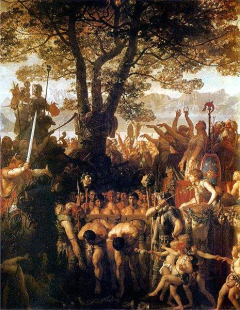 The first clancaesar encountered (or sought out?),were the Helvetii, the sometime inhabitants of what is now Switzerland. The Helvetii had made several expeditions towards the Atlantic cost and possibly intended to move there permanently. During these exploratory visits to the west the Helvetii had defeated Roman armies in the isolated Garronne valley and reached as far west as Agen.
The first clancaesar encountered (or sought out?),were the Helvetii, the sometime inhabitants of what is now Switzerland. The Helvetii had made several expeditions towards the Atlantic cost and possibly intended to move there permanently. During these exploratory visits to the west the Helvetii had defeated Roman armies in the isolated Garronne valley and reached as far west as Agen.According to Caesar, after defeating the Romans the Helvetii forced them to pass under a yoke. Caesar saw this as great dishonour, requiring revenge.
Caesar forced them back to their homeland as foederati, allies of the Romans. He wanted to use them as a buffer state against the Germanic peoples, who themselves were moving west.
After this initial battle Caesar’s advance took the form of a tour of Gaul. He moved fast displaying himself and his army to as many tribes as possible. The only battles he fought were when he was attacked. The Roman victory was aided by the fact that the Gallic clans were independent of each other. We can learn from the Gaelic culture much later in Scotland and Ireland that there was probably constant inter clan warfare, certainly fierce inter clan competition.
Veneti
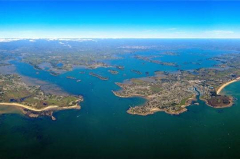 He did seek out one other battle, agains the Veneti, who from their stronghold in the Golfe de Morbihan dominated shipping along the atlantic coast. They were skilled sailors and a continual threat to the Romans. Caesar build a specially designed fleet of ships to defeat the Veneti and the entire tribe was sold into slavery elsewhere in the empire.
He did seek out one other battle, agains the Veneti, who from their stronghold in the Golfe de Morbihan dominated shipping along the atlantic coast. They were skilled sailors and a continual threat to the Romans. Caesar build a specially designed fleet of ships to defeat the Veneti and the entire tribe was sold into slavery elsewhere in the empire.
Vercingetorix
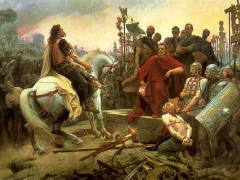
Helvetii then became the first example of a foederati who rejected the status they were given and revolted against Roman Rule. After only six years later they supported Vercingetorix in a general uprising.
There is no specific evidence that Vercingetorix was recognised as High King but he eventually led a unified Gallic army against Caesar and came close to defeating the might of Rome. Vercingetorix utlimately surrendered.
This event is recorded in the famous painting in the museum at Le Puy en Velay.
The picture is itself an illustration of how difficult the detail of history can be. The depiction of Gauls with long hair and moustaches is somewhat of a cliche. The horse is a breed which was not in Gaul at that time. Gauls rode bareback, they did not use saddles. Roman shields at the time were round not rectangular, The rectangular shield came much later.
In the longer term there proved to be great compatibility between Rome and the Gauls .
The Celts were allowed to retain the major features of their culture and to worship their own gods in their own way.
It was so different from the East where order was exerted from Rome through a hierachical structure of governors and client kings.
The Dictatorship
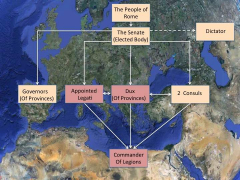 Supposedly in times of great difficulty the senate could delegate all of it’s powers to one man. Caesar’s position was slightly different, some said that the main danger to the roman state was Caesar himself. Nevertheless The senate gave him a dictatorship, believing perhaps that he was still responsible to the senate for what he did and therefore was under some sort of control.
Supposedly in times of great difficulty the senate could delegate all of it’s powers to one man. Caesar’s position was slightly different, some said that the main danger to the roman state was Caesar himself. Nevertheless The senate gave him a dictatorship, believing perhaps that he was still responsible to the senate for what he did and therefore was under some sort of control.
Caesar as high king
 Of the three members of the triumvirate Crassus now was the only one not to have military success. He sought to achieve this success success against the Parthians in the East but had a contrasting experience, failure which ended in his death.
Of the three members of the triumvirate Crassus now was the only one not to have military success. He sought to achieve this success success against the Parthians in the East but had a contrasting experience, failure which ended in his death.
Ceasar now was in a position to challenge Pompey as high king of the total celtic world. Pompey declared his opposition to Caesar’s ambition but was defeated and was murdered after a flight to Egypt. Only days later Caesar met Cleopatra and eagerly formed a relationship with her.
Cleopatra
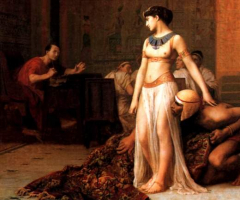 Cleopatra was not the first Egyptian princess to form a relationship with Rome’s patrician families, but what was unusual was that Caesar made the relationship so public. Clearly super confident because of the vast resources, both financial and military at his disposal Caesar ignored the sensitivities of Roman Society.
Cleopatra was not the first Egyptian princess to form a relationship with Rome’s patrician families, but what was unusual was that Caesar made the relationship so public. Clearly super confident because of the vast resources, both financial and military at his disposal Caesar ignored the sensitivities of Roman Society.
Pompey’s two sons and the survivors of Pompeys legions made their way back to Hispania where in 45 BC Caesar finally defeated them. Briefly Caesar, High King of the Celts became dictator of Rome. He was assassinated in 44 BC because he now represented the interests of the Celtic world not the interests of the Patrician families.
The Plebeians
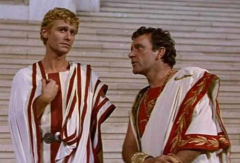 By the time of Julius Caesar (70 BC) wealthly plebians could also follow the Cursus Honorium but would usually include an appointment as “Tribune of the Plebs” a position not open to patricians.Mark Anthony held this position and therefore was, in the eyes of Rome, a plebian.
By the time of Julius Caesar (70 BC) wealthly plebians could also follow the Cursus Honorium but would usually include an appointment as “Tribune of the Plebs” a position not open to patricians.Mark Anthony held this position and therefore was, in the eyes of Rome, a plebian.
Anthony
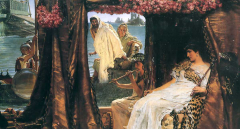 Anthony did not have a high profile in Celtic eyes. Though he had been in Gaul with Caesar he had been mainly concerned with defending the eastern frontier, an important but subsidiary role.
Anthony did not have a high profile in Celtic eyes. Though he had been in Gaul with Caesar he had been mainly concerned with defending the eastern frontier, an important but subsidiary role.
It is difficult to understand why Cleopatra chose Anthony as her second roman partner, perhaps she did not realise how important the Gallic world had become, perhaps at that point in time she believed all Anthony had to do was become Roman Emperor to control the whole empire. In the short term, it seemed that they were content to consolidate in the east, even to go so far as to redistribute the eastern half of the empire amongst Cleopatra’s children.
